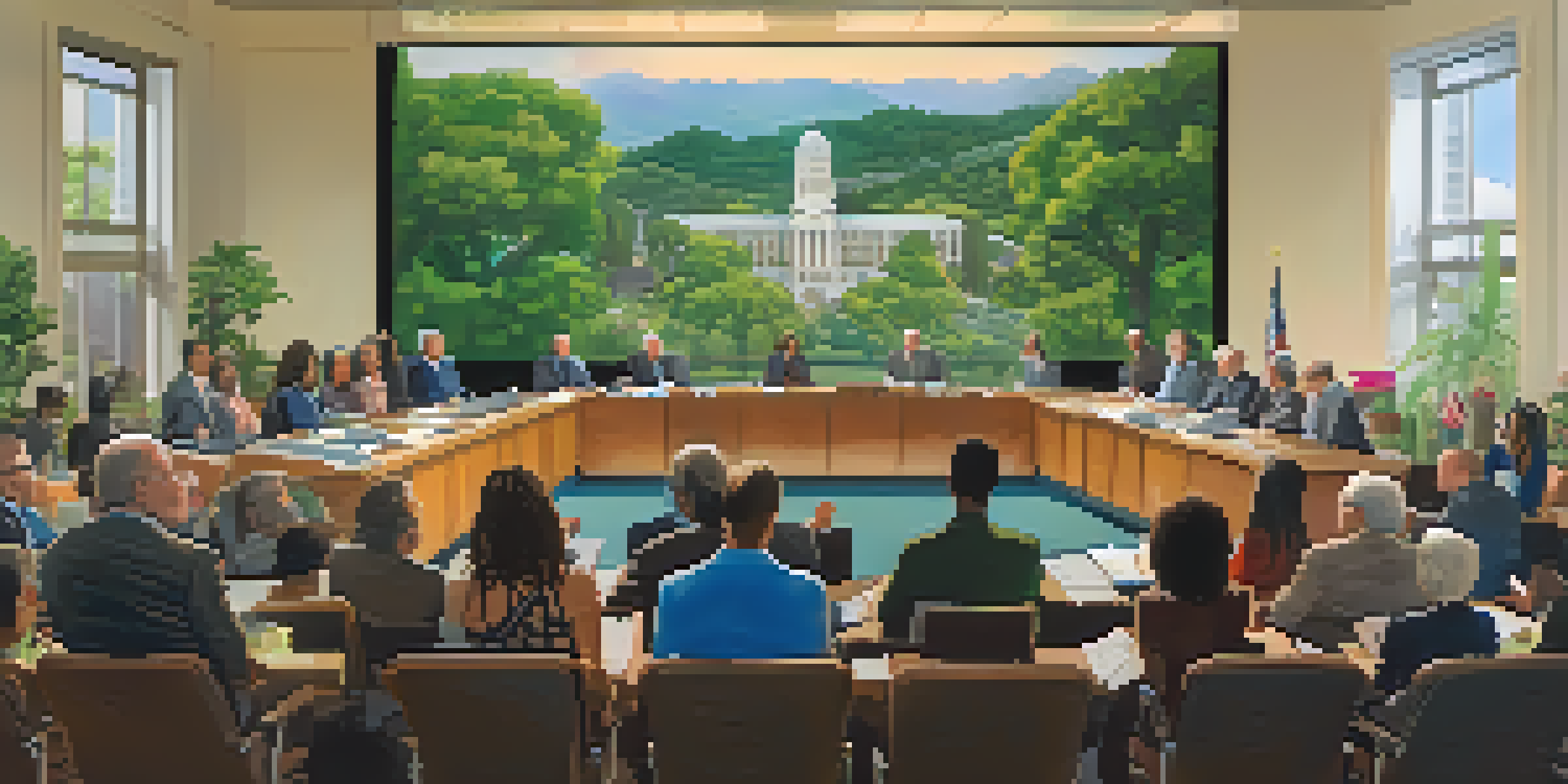Pasadena's Budget Process: How Local Government Allocates Funds

Overview of Pasadena's Budget Process
Pasadena's budget process is a crucial framework that helps local government allocate funds effectively. It involves a series of steps aimed at ensuring transparency and accountability in how taxpayer money is spent. Understanding this process not only informs citizens about where their money goes but also empowers them to participate in local governance.
Budgeting is the process of allocating resources to achieve the goals of the organization.
The budget is typically developed annually, reflecting the city's goals and priorities, which can change based on community needs and economic conditions. Citizens can influence these priorities through public hearings and community forums. This collaborative approach ensures that the budget aligns with the values and needs of the community.
Ultimately, the budget serves as a financial roadmap for the city, outlining expected revenue and expenditures. It encompasses various sectors, from public safety to infrastructure, ensuring that all aspects of city life are adequately funded.
Key Players in the Budget Process
Several key players are involved in Pasadena's budget process, each contributing unique perspectives and expertise. The City Manager plays a pivotal role by proposing a balanced budget based on the city’s needs and available resources. This proposal is then reviewed by the City Council, which makes final decisions on allocations.

Additionally, various departments, such as Public Works and Parks and Recreation, provide input regarding their funding needs. Their insights help shape the budget by highlighting essential services that require financial support. Citizens also have a voice through public comment periods, allowing them to share their views and priorities.
Pasadena's Budget Process Explained
The budget process is a collaborative effort that ensures transparency and accountability in local government spending.
This collaborative effort ensures that the budget reflects the community's aspirations while also adhering to fiscal responsibility. By understanding these roles, residents can better appreciate how decisions are made and the importance of their participation.
The Timeline of Budget Development
The budget development timeline in Pasadena typically spans several months, starting well before the new fiscal year. It usually begins in the fall, when departments submit their budget requests based on projected needs. This initial phase is crucial, as it sets the stage for discussions and negotiations.
Public participation is essential for effective governance and community engagement.
By winter, the City Manager compiles these requests into a draft budget, which is then presented to the City Council in the spring. This presentation includes detailed justifications for funding allocations, allowing council members to ask questions and suggest adjustments. The transparency at this stage is vital for public trust.
Finally, after review and revisions, the budget is adopted by the City Council in June. This timeline ensures that the budget is not only well-considered but also aligns with the city's operational goals for the upcoming year.
Public Involvement and Transparency
Public involvement is a cornerstone of Pasadena's budget process, ensuring that community voices are heard and considered. The city holds multiple public hearings, where residents can express their opinions and priorities regarding funding allocations. These sessions are designed to foster dialogue between city officials and the community.
Transparency is enhanced through the publication of budget documents and summaries that are accessible online. This allows residents to review proposed expenditures and understand the rationale behind budget decisions. When citizens have clear access to this information, it strengthens trust in local government.
Community Voices Matter in Budgeting
Public involvement through hearings and accessible documents empowers residents to influence funding priorities.
By engaging the public in meaningful ways, Pasadena not only promotes accountability but also cultivates a sense of ownership among its residents. This collaborative spirit helps build a community that is informed and actively involved in shaping its future.
Budget Challenges and Considerations
Like any city, Pasadena faces its share of budget challenges that complicate funding allocations. Economic fluctuations, such as recessions or unexpected expenses, can strain resources and necessitate tough decisions. These challenges require city officials to prioritize certain services over others, which can lead to difficult discussions.
Moreover, compliance with state and federal regulations can further complicate budget planning. For instance, mandates for certain programs or services may require funding adjustments that the city must accommodate. Understanding these challenges can help residents appreciate the complexities involved in budget management.
Ultimately, navigating these hurdles is part of the responsibility of local government, and it underscores the importance of flexible and strategic planning. By being aware of these challenges, residents can better support and engage with their local leaders.
Evaluating Budget Outcomes
Evaluating the outcomes of the budget is essential for understanding its effectiveness and impact on the community. Pasadena's local government assesses whether the allocated funds have achieved their intended goals through various metrics and reports. These evaluations help identify areas of success and those needing improvement.
Regular reporting to the City Council and the public ensures that residents stay informed about how well the budget is performing. This transparency allows for adjustments and reallocation of funds as necessary, ensuring that the city remains responsive to changing needs. These evaluations also foster accountability among city departments.
Future Trends in Budgeting
Sustainability, technology, and enhanced community engagement are shaping the future of Pasadena's budgeting process.
By focusing on outcomes, Pasadena can continuously refine its budget process to better serve its residents. An ongoing commitment to evaluation encourages a culture of improvement and responsiveness, ultimately benefiting the entire community.
Future Trends in Pasadena's Budgeting
As Pasadena looks to the future, several trends may shape its budgeting process. One significant trend is the increasing emphasis on sustainability and climate resilience. City leaders are recognizing the need to allocate funds toward green initiatives, which not only benefit the environment but also promote long-term economic stability.
Additionally, technology is playing a larger role in budgeting processes. Data analytics can facilitate better decision-making by providing insights into spending patterns and community needs. This technological shift can lead to more efficient fund allocation and improved service delivery.

Lastly, community engagement is likely to continue evolving, with more opportunities for residents to participate in the budget process. As technology advances, platforms for feedback and collaboration may enhance how citizens interact with their local government, fostering a more inclusive approach to budgeting.